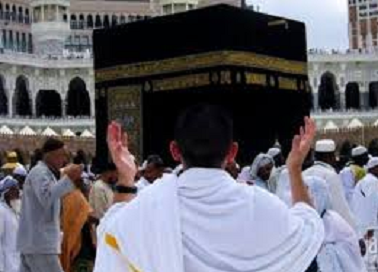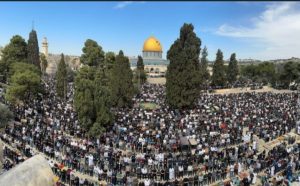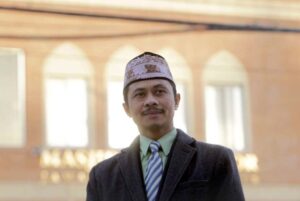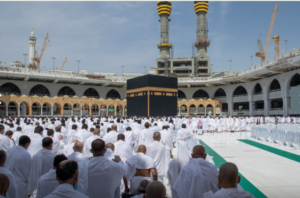By: Imam Shamsi Ali, President of Nusantara Foundation, New York
It is the ummah’s agreement that Hajj is an obligation (tardho) for all Muslims, and has fulfilled the requirements of its obligations.
The verse of the Qur’an has previously been mentioned: “and it is for Allah above mankind to perform the pilgrimage to the Baitullah for those who are able to do it”.
Even further, the Messenger of Allah sallallahu ‘alayhi wa sallam established the Hajj as one of the five pillars of Islam: “Islam is founded on five foundations: the creed that there is no god but Allah and Muhammad is Allah’s Apostle, establishing prayer, paying zakat, fasting Ramadan, and making the pilgrimage to the Baitullah for those who can.”
Also Read: Fryday Sermon: Hijrah in the Struggle for the Liberation of Al-Aqsa and Palestine
Because it is an obligation as well as a pillar of religion, all people agree (ijma’ al-ummah) to accept it as fard. Even performing the pilgrimage is the dream of all people.
In the past, performing the pilgrimage was even labeled as a special “call”. Some who do not or have not performed Hajj make this an excuse. “Ah no call yet”, they said.
It is also a consensus (ijma ‘) of the scholars that Hajj is an obligation only once in life. This means that the obligation to be completed when doing it the first time. Even if a person performs Hajj many times after that, then the Hajj is not an obligation. But it is a sunnah worship that gets a reward from Him.
When the order for Hajj was delivered to their companions, they asked: “Is it every year, O Messenger of Allah? Asked like that he was silent. Asked again the same thing but he was silent. Until the third question he answered: “If only I said yes, then it has been obligatory on you every year”.
Also Read: Sadaqah, A Simple Act with Extraordinary Virtues: Dr. Wahyudi KS
Therefore, he kept silent to emphasize that a clear commandment was no longer questioned. Because the consequences can be more complicated and burdensome.
Since the Hajj is obligatory only once, the question that then arises is whether to perform the obligation immediately? Or can it be postponed and at any time while still alive?
All scholars gave a firm answer that the obligation of Hajj must be performed as soon as possible if the “conditions of obligation” have been fulfilled.
It is only Imam Shafi’i who allows delaying the performance of the Hajj obligations. That too with a condition. That a person who delays performing the pilgrimage, even though he has fulfilled the conditions, must be sure not to die until he performs it.
Also Read: The Dynamics of Living in a Muslim Community in the Modern Era
This requirement is actually an affirmation requirement only. That if he is capable, but still does not do it and dies then he will die in a state of great sin. Even his death is likened to death in a “nashronian or jewish” state.
Returning to the conditions for the obligation of Hajj above, the scholars mention five conditions that make Hajj obligatory on a person.
First, the person is indeed a Muslim. Second, the person is balig (in men, it is usually marked by wet dreams. In women, with the arrival of the first menstruation). Third, the person concerned is sane.
The three conditions above are the conditions for all worship in Islam. Non-Muslims, minors, and the insane are not required to perform worship in Islam.
Also Read: The Meaning of “Minal Aidin wal Faizin”
Then the fourth condition of the obligation of Hajj is that the person concerned is a free person In the past this rule was a “mercy” for slaves who became Muslims. Because they are still in their master’s possession and that doesn’t allow them to carry it out.
And the fifth is that the person concerned does have isthitho’ah. That is having the ability to do it. In the hadiths, two things are emphasized about this ability.
One, is about traveling (rahilah) or can one get there?
In the past this involved camels, horses or the ability to walk all the way to the holy land. Right now I’m sure it’s related to the means of transportation. If it is taken to the factual shutter then can the person concerned buy a plane ticket?
Also Read: The Atrocities of Zionist Israel During Ramadan
Second, regarding supplies (zaad). I believe all of these fall into the ONH (Hajj) category. In the end it is also whether the money is available or not.
In terms of istitho’ah, there are indeed many related questions. For example, what if there are still debts? Including, for example, the installment payable to buy a monthly house or a mortgage?
It will be discussed in due course. But the point is that the obligation of Hajj is included in the main obligations of Islam and it should be done immediately if the mandatory requirements have been met.
Perhaps a related question, especially from a Muslim-majority country like Indonesia, is the issue of quotas.
Also Read: Imaam Yakhsyallah Explains the Interpretation of Quran Surah Asy-Shura Verses 13-15
With the quota rules from the Saudi Arabian government, what about those who are scheduled to leave in the next 20 years but die before leaving? I heard that currently with the Covid-19 crisis, some are even waiting for 90 years. It is certain that the congregation concerned will not leave.
Then what is the legal status? The answer is that he has been released from the obligation of Hajj. Because since registering he has intended to carry out his obligations. But for one reason or another the person concerned has not had time. But his intention has been counted as a pilgrimage in the sight of Allah Subhanallahu wata’ala.
May Allah grant Mabrur Hajj for those who make Hajj. Amen. (T/RE1)
Mi’raj News Agency (MINA)
Also Read: Imaam Yakhsyallah Mansur: Mosques Play a Central Role During Ramadhan




























![MUI Chairman for Foreign Relations and International Cooperation, Sudarnoto Abdul Hakim (center) at the One Million Women for Gaza Press Conference entitled "Women Boycott Pro-Israel Products" held at the Swiss-Belinn Cawang Hotel, East Jakarta, Thursday (3/7/2025). [Photo: Arina/MINA]](https://en.minanews.net/wp-content/uploads/2025/07/20250703_144042-scaled-1-300x225.jpg)





 Mina Indonesia
Mina Indonesia Mina Arabic
Mina Arabic